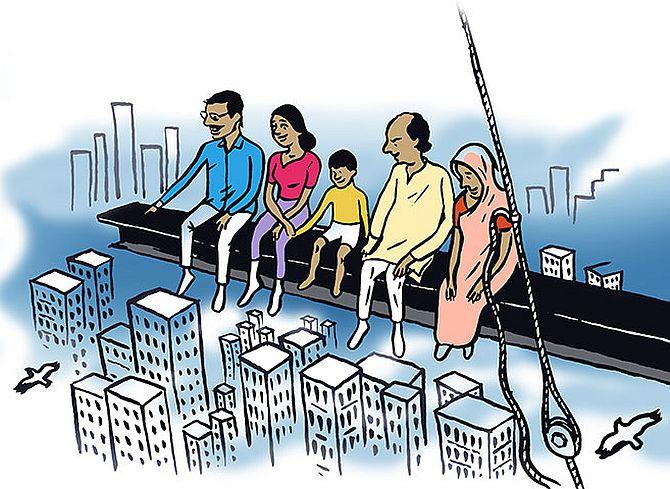India's residential market is expected to sustain demand momentum despite rise in mortgage and property rates as sales this year across the top 7 cities are likely to breach pre-pandemic level of 2.62 lakh units, industry players said.

After braving four back-to-back disruptions in form of demonetisation, RERA, GST and COVID-19 in the last 6 years, industry experts feel the housing market is going through a lot of structural changes and is now at the start of a long-term upcycle.
Homebuyers body FPCE gives credit to the Real Estate Regulatory Authority (RERA) under the Real Estate (Regulation & Development) Act, 2016 for this improved buying sentiment.
All major listed real estate developers posted record sales bookings in the last fiscal and have given guidance that their sales numbers in FY'23 will be even better.
However, if the overall market is taken into account and not just listed entities, the RBI's decision to hike interest rates by a cumulative 140 basis points and banks passing on this increase to home loan borrowers have slowed down sales mometum slightly.
Increase in housing prices also had some impact, according to industry experts.
Prices rose by an average 5 per cent annually in the June quarter due to higher input costs, especially that of cement and steel.
But developers and brokers feel the increase is short-term and demand will pick up significantly from the festive season.
Property consultant Anarock said housing sales this year across seven major cities -- Delhi-NCR, Mumbai Metropolitan Region (MMR), Chennai, Kolkata, Bengaluru, Hyderabad and Pune -- will cross 2,61,358 units recorded in 2019, the pre-pandemic level, but will fall short of the 2014 sales figure of 3.43 lakh units, the highest in the last 10 years.
"India's housing industry is at the start of structural upcycle," Macrotech Developers MD and CEO Abhishek Lodha said, adding he was bullish on the growth for the next 10-20 years.
Better wage growth, increase in the relevance of housing to the family after COVID-19, and consolidation of supply-demand towards credible developers were some of the factors listed by Lodha that will drive growth.
Lodha also strongly believes that modest appreciation in housing prices is good for the market.
"We believe the housing market is in a strong situation and if it is supported well by various policy makers, housing industry can contribute significantly to India's economic growth in this year and the years to come," Lodha told PTI.
Stamp duty reduction by the Maharashtra government had played a major role in reviving sales during the pandemic.
Housing sales had plunged by almost half in 2020, but bounced back last year.
Lodha mentioned that historical data suggests that there is no impact on housing demand till 8.5 - 9 per cent interest rates on home loans.
Godrej Properties Executive Chairman Pirojsha Godrej noted that the market in the last two years saw best affordability as interest rates came down to 6.5 - 7 per cent while property prices had remained stagnant in the last 7-8 years.
He said affordability continues to remain attractive.
"It has been almost one and half years of good sales for pretty much everyone.
"We came out of 8-9 years of down cycle in the sector.
"Affordability even today, even with some price increases and some improvement in interest rate, is still much, much better than it was in any period in the last 20 years, other than maybe the last year and a half," Pirojsha Godrej told PTI.
"So I think there's still all the makings of up market in place," he observed.
The real estate sector has witnessed a boom in the past even when interest rates were at 10-12 per cent, he noted.
"Market, to my mind, is driven more by what is people's perception of both how is the economy doing and how is their personal financial situation going."
Abhay Upadhyay, president of the Forum For People's Collective Efforts (FPCE), an umbrella body of homebuyers, noted that pent up demand of over the last decade is now getting converted into actual transactions.
He said the housing sales momentum may sustain provided builders live up to the promises of timely delivery.
"Consumer sentiments and confidence in the housing market have improved after the enactment of real estate regulation law RERA.
"People strongly believe that they will get flats if projects are registered with RERA."
Anarock chairman Anuj Puri pointed out that the repo rate hike did have some repercussions on the housing sales in the June quarter, dropping 15 per cent from the previous quarter.
"The moderation in Q2 2022 could be a momentary blip and not a major dip in the housing sales.
"This is largely because homeownership has become a much more compelling desire during the pandemic," he said.
Puri, though, feels that mortgage rates are inching towards the 'red zone', which could impact sales in the affordable housing category.
Realtors' apex body CREDAI's National chairman Harsh Vardhan Patodia said real estate developers are taking steps to reduce the impact of the rising interest rate on potential homebuyers' so that the strong sales momentum continues.
Builders will introduce lot of offers during the upcoming festival season to sustain demand, he added.
Already, many companies including Macrotech Developers (Lodha Group) and Tata Housing have announced schemes to bear some interest burden on behalf of the homebuyers for a certain period.
Niranjan Hiranandani, National Vice Chairman- NAREDCO, said 'Housing for All' is still a distant dream, and hence the demand for homes will be perennial.
"The sentiment for ownership home runs deep amid volatile pandemic menace. The need for stability and security has emerged in high preference in the minds of people due to unprecedented flurry of events.
"The current spiralling home loan interest rate is unlikely to compress sustainable housing demand as the price band is still in line of control," he said.
As a home loan is at a floating rate for 15-20 years, Hiranandani said it averages out the cost of borrowing favourably in the long term.
V Swaminathan, executive chairman, Andromeda loans and Apnapaisa.com, said the repo rate hike will increase burden on both existing and new home loan borrowers.
Those who took home loans in April or earlier were paying around 6.5 - 7 per cent interest rate and now the mortgage rate will climb to around 8 - 8.5 per cent, he added.
However, the industry expects minimal impact of this hike in home loan rates and is gearing up for strong sales in the upcoming festive season -- Diwali and Durga Puja.
With demand consolidation towards credible players gaining momentum, all major listed players have set an aggressive target for sales booking as well as addition of new land parcels for future development in the current fiscal year.










